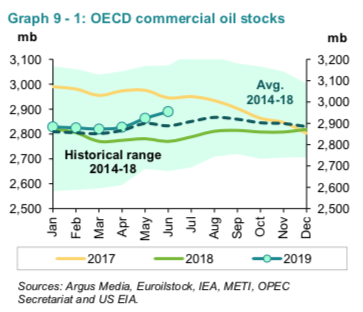Debunking ‘Lower Oil Supply Will Raise Prices’
We often hear the statement, “When oil supply is lower, oil prices will rise because of scarcity.” Now, we are getting to see firsthand whether oil prices really do rise, as oil supplies become more scarce.

Figure 1 shows that world oil supply hit a peak in November 2018 and has declined since then, mostly because of a decline in OPEC’s production. So, total oil production seems to be down for about eight months, relative to the peak in November 2018.
Despite this big cutback by OPEC in its oil production, prices have not responded as OPEC had hoped:

In fact, as I write this, Brent oil price is currently quoted as $60.48, which is back in the range of December 2018 and January 2019 low prices. Also, reducing production doesn’t seem to be reducing inventories. Figure 3 suggests that they are now higher than they were before the reduction in oil supply took place.

Why aren’t oil prices rising and oil inventories falling, if oil production has fallen?
The basic issue is that the economy is very much interconnected under the laws of physics, because energy is required for every activity that is considered part of GDP. Energy is required for any kind of heat or any kind of movement. Energy is even required for electricity. Without energy from the sun, food can’t grow; without supplemental energy of some kind (such as using electricity to heat an electric stove or burning animal dung or sticks), it becomes impossible to cook food or smelt metals.
…click on the above link to read the rest of the article…